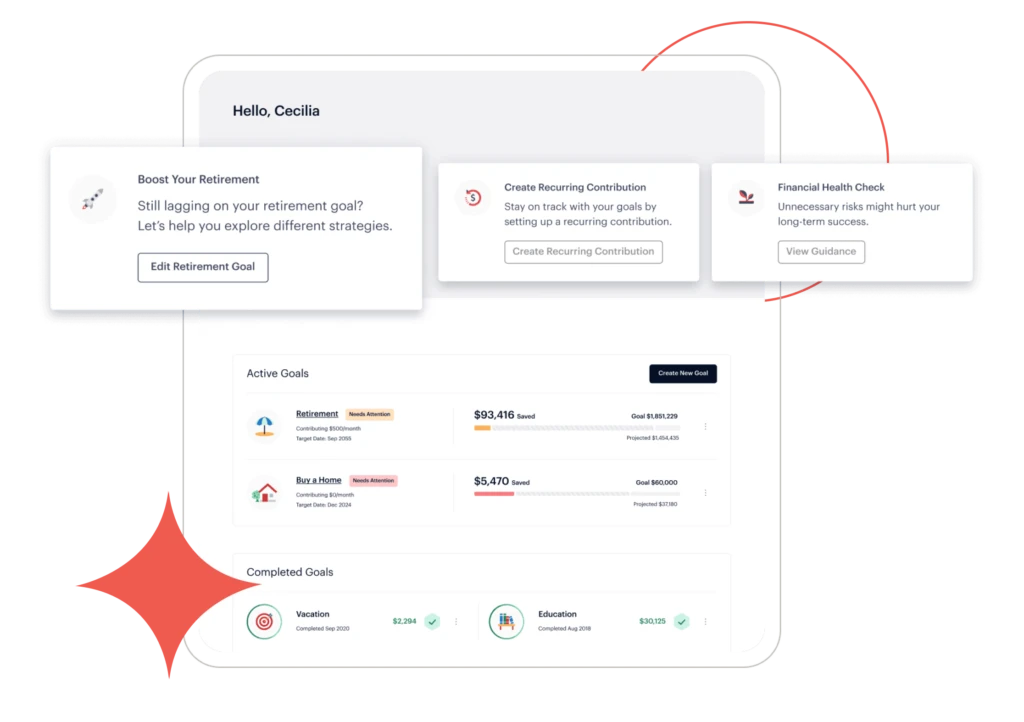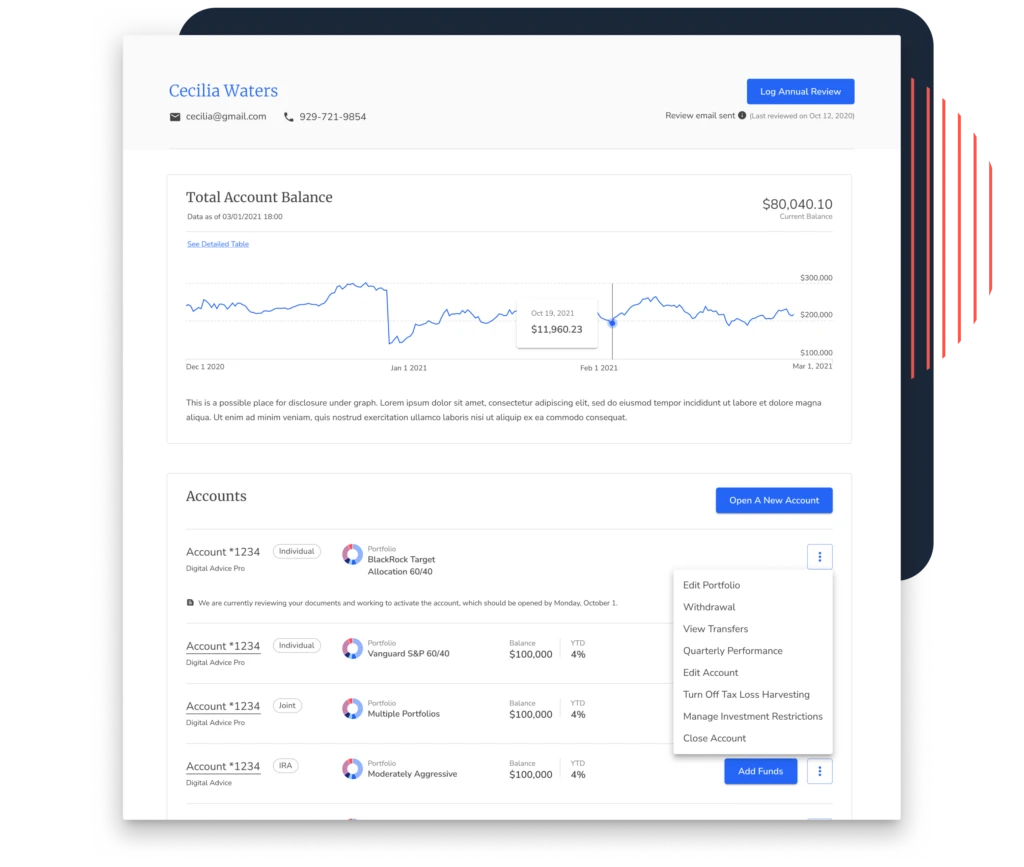
Caylent Services
AWS Foundations & Migrations
From rehosting to replatforming to rearchitecting, Caylent will help you leverage AWS to its fullest potential to meet your business objectives.

Customer Onboarding Time
SigFig is a financial services technology company that offers digital solutions to empower financial advisors and clients. Through curated digital investing experiences, SigFig’s integrated services are designed to provide investors with portfolio options tailored to their unique financial needs and goals, aimed at helping them achieve financial wellness.
Founded in 2006, SigFig started with a portfolio tracking tool, and since then, they have rapidly grown to 4 countries, with more than 160 employees, serving large retail banks including Wells Fargo and UBS.
SigFig provides clients with a digital-first experience, requiring an infrastructure configuration that can provide high availability, minimizing the risk of outages that can impact SigFig’s customer value proposition.

During the pandemic days, SigFig faced supply chain disruptions that made it very difficult for them to procure hardware to scale their infrastructure. They also faced challenges in finding enough talent with diverse expertise to address engineering problems. These problems were further compounded in 2021 as their customer base and footprint grew concurrently. These challenges resulted in RPOs that were excessive from a customer point of view.
The company initially had a hybrid infrastructure setup with VMware that was proving costly from unnecessary licensing and support costs, and it was difficult to manage and scale. On the networking front, they faced challenges with a widely distributed network, NAT gateways issues, and traffic routing. The process of spinning infrastructure up and down was largely manually and thus error prone.
While all companies experience losses during downtime, the cost for Financial Services companies is often much higher. Recent research from Uptime Institute’s 2022 Outage Analysis Report found that downtime costs continue to rise. Over 60% of outages cost more than $100,000, an increase from 39% in 2019. 15% of outages cost more than $1 million, an increase from 11% in 2019.
SigFig was looking for an infrastructure that could scale quickly and cost-effectively, while also providing strong security and compliance capabilities. Also, given the magnitude of the potential risk from downtime, the need to increase resiliency in the new system was clear. In their evaluation, SigFig found that their needs were best met by AWS.
In order to ensure success, the company was looking for an agile cloud services partner who could understand the intricacies of their existing infrastructure while also being able to strategize and roadmap an effective migration.They also wanted someone who could implement the roadmap and execute at an accelerated pace. After their evaluation, they found a partner they could trust in Caylent.

To address these challenges, Caylent conducted a series of workshops to outline existing client tooling and cloud objectives to select the best tooling for AWS, combining existing on-prem and cloud native offerings. The outcome provided Caylent and SigFig with a complete design and workload migration plan.
SigFig's migration started from ground zero, and there were tight timelines, special requirements, and compliance regulations to be considered. The team used a combination of AWS Landing Zone Accelerator (LZA) and Terraform for the infrastructure. Caylent created re-usable Terraform templates to support AWS Foundational deployments as well as future expansion efforts.
The team also coordinated LZA deployment with daily testing and QA workloads to ensure a smooth transition. By leveraging LZA, Caylent could provide SigFig with a central place to easily manage their accounts, networking, and necessary security processes.
SigFig wanted to migrate its infrastructure to the AWS cloud and modernize its workloads. The company wanted to use Landing Zone Accelerator (LZA) with AWS Firewall, network rules, centralized egress, and NAT gateways. They also wanted to use Amazon CloudFront and WAF for public-facing applications, site-to-site VPN for on-premises, and AWS Transit Gateway as an interconnect between their co-locations, offices, and VPCs. A deployment pipeline was created with Terraform deploying to individual accounts.
The solution had two main components: EKS with Fargate for seamless autoscaling and LZA with Terraform for repeatable infrastructure. The use of Fargate means that scaling and replacement of the instances running EKS was moved to the AWS side of the Shared Responsibility equation. The AWS infrastructure would automatically add new capacity to meet changing load and would automatically replace failed instances.
Caylent helped SigFig modernize their applications by implementing Amazon EKS and leveraging network load balancers to centralize ingress to their clusters.
The use of managed services such as EKS and Load Balancers provides the system with a greater ability to gracefully and automatically respond to changes in load and to auto heal from failures. Monitoring and logging were also enhanced which provided greater observability to SigFig’s operations teams, which in turn helped them achieve higher levels of uptime.
Both the RDS database and ElastiCache components were set up in multi-AZ configurations to allow for seamless business continuity in the event of an Availability Zone outage. They also implemented a Pilot light strategy with RPO of 1 minute, RTO of 2 hours.
Caylent built a networking solution from scratch that could connect their AWS, on-premises, and other hosting environments leveraging a centralized approach. Their VPC flow logs were centralized and AWS native services were employed to provide secure connectivity. Utilizing a variety of network and traffic rules, and cross account transit gateways, Caylent built a custom and resilient networking architecture that resolved routing constraints.
By working closely together Caylent understood SigFig’s needs and business objectives and recommended several specific AWS Cloud Financial Management tools to gain comprehensive visibility into their cloud spending patterns and resource utilization based on their needs.
SigFig leveraged AWS's Cloud Financial Management tools per Caylent's recommendation to gain comprehensive visibility into their cloud spending patterns and resource utilization. By implementing AWS Cost Explorer, SigFig was able to visualize and analyze their cost and usage data across all AWS accounts, helping them identify trends and usage peaks. The company also utilized AWS Budgets to set custom spending thresholds and receive notifications when costs exceeded these limits, enabling proactive cost control measures.
Additionally, SigFig employed AWS Trusted Advisor to obtain automated recommendations for optimizing costs, such as identifying idle resources and suggesting Reserved Instance purchases. These tools, combined with AWS Cost Anomaly Detection, which uses machine learning to identify unusual spending patterns, allowed SigFig to quickly pinpoint areas of inefficiency and take corrective actions. As a result, SigFig significantly reduced its infrastructure costs by eliminating unnecessary licensing and support expenditures, while also improving its ability to provision and tear down environments more efficiently.

SigFig's move to the cloud was a necessary step to improve the performance, scalability, and resilience of their digital wealth management platform. SigFig realized several benefits. Their customer onboarding time decreased from weeks to days, and they were able to provision everything automatically instead of manually. The time required to set up a new production environment has come down from a few months to less than a week. Additionally, it takes a few hours to tear down environments that are not needed, reducing SigFig's infrastructure costs significantly. While cost has its own pillar in the Well Architected Framework, cost optimization is a component of the Reliability Pillar as well. Further cost savings were also achieved by removing unnecessary licensing and support spend.
SigFig’s infrastructure is now more resilient, scalable, and reliable, significantly reducing maintenance requirements. By modernizing on AWS, SigFig was able to accelerate their time to market and focus on improving their customer experience instead of managing infrastructure, helping them align internal resources towards their business goals. The move to the AWS cloud also enabled SigFig to better align their offerings to a SaaS-based solution, which is increasingly important for modern application delivery.

Caylent Services
From rehosting to replatforming to rearchitecting, Caylent will help you leverage AWS to its fullest potential to meet your business objectives.

Caylent Catalysts™
Accelerate the adoption of a production ready AWS foundation, and establish automated security guardrails to keep existing and new accounts in compliance with your desired security posture.

SigFig has been working with Caylent for the past year, and we have been consistently impressed with their professionalism, expertise, and dedication to SigFig's overall goals.
Caylent has always been responsive to our evolving needs, and they've always gone above and beyond to deliver high-quality work on time and within budget.
I'm confident that Caylent would be a valuable asset to any organization. They're a team of highly skilled and experienced professionals who are committed to providing exceptional customer service. I highly recommend them.
Sreerama Jayanthi
VP of Engineering
Company

Using a combination of design, data science, and technology, SigFig helps empower people with the information and guidance they need to achieve their personal financial goals. Partnered with the world’s largest and most innovative financial institutions, SigFig helps clients access, and advisors provide, investment advice efficiently with next-generation digital experiences.
Location
SF, California
Industry
Share